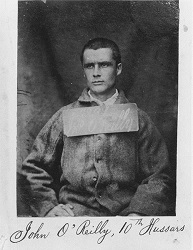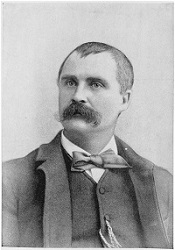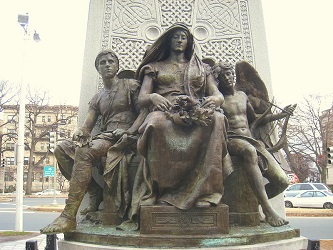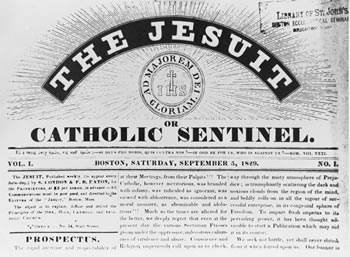Life
| 1844-90; b. 28 June, at Dowth Castle, nr. Drogheda, Co. Louth; son of William David O’Reilly, a school master in National School pertaining to the Netterville Inst.; his mother was Eliza Boyle, related to Col. John Allen of 1798 fame; second child of 5 dgs. and 3 sons; apprenticed to newspaper compositor on Drogheda Argus, 1855 (aetat. 11), up to the death of the proprietor; went to live with relatives in Preston, England, sailing from Drogheda on ship under command of Capt. John Watkinson, who was married to a sis. of Mrs O’Reilly; employed on Preston Guardian; joined 11th Lancashire Rifle Vols.; called home by father, March 1863; settled in Dublin; enlists in 10th Hussars, stationed in Dublin, 1863; | |
| joined Fenians [IRB], 1865; purportedly swore in 80 soldiers as Fenians; arrested and sentenced to death by court martial, 9 July 1866; sentence commuted to life imprisonment [var. 20 years]; he inscribed on Mountjoy cell wall, ‘once an Irish soldier, now an English felon, and proud of the exchange’, 17 July 1866; spent a year in solitary confinement in Millbank Penitentiary - under the puritanical regime of that prison; moved to Dartmoor, from which he escaped and was recaptured after some days; transported to Western Australia on board Hougoumont, with Denis B. Cashman - who kept copies of O‘Reilly’s poems in his manuscript diary - and others, 1867; arrived at Fremantle, and there held as prisoner No. 9843; worked as ticket-of-leave man; served as aide to the parish priest, and supervisor of a lending library; | |
|
afterwards assigned to a Bunbury-Vasse road crew, working as as clerk and messenger; fell in love with Jessie, daughter of the Warder Henry Woodman; attempted suicide by cutting wrists, 27 Dec. 1868; planned his escape with Fr. Patrick MacCabe and a settler named James McGuire; deserted from his road-crew, 18 Feb. 1869, and suffered hardships in the dunes when the designated carrier, Vigilant, failed to spot his boat; finally escaped to America on board the Bedford whaler Gazelle, having been blackmailed by a ticket-of-leave man called Henderson (alias Martin Bowman), who secured his own passage on the whaler; befriended the captain and third mate (Gifford and Hathaway), and survived British search at Rodrigues, when Bowman was handed over in chains; |
|
| faked suicide overboard to convince the British of his death; changed ship at sea and joined the Sapphire, another whaler, as a working sailor; landed at Liverpool, and departed for America on the Bombay; reached Philadelphia, 23 Nov. 1869; moved to Boston, 1870; joined The Pilot newspaper (Boston), 1870, becoming co-prop. with Archbishop Williams, 1876-90 [see infra]; m. Mary Murphy (orig. from Charleston, Co. Mayo), 1872; worked as a lecturer and a writer; issued Songs from the Southern Seas (1873) and Songs, Legends and Ballads (1878), the latter of which ran to 8 edns. | |
| ; condemned the Custer massacres of native Americans [Indians], 1876, and campaigned for civil rights for Black Americans - but not for women; associated with the abolitionist and civil rights advocate Wendell Phillips (d.1884), for whom he wrote an elegy; participated in Fenian Canada Raid and the Catalpa expedition to rescue sick Fenian prisoners from Western Australia, 1875 [see John Devoy, q.v.]; issued two other vols. of poetry and novel, Moondyne (ser. in The Pilot [Boston], 1878; Kennedy 1879), the story of his Australian experiences, sometimes called the first Australian novel, which went into 12 eds.; he presented an address welcoming Parnell to New York, 1880; | |
| he was invited to speak at Ottawa on St. Patrick’s Day, but refused permission by British Govt.; also The Statues in the Block (1881), poems; offered reward for apprehension of Invincibles after Phoenix Park Murders; published letter of Lakota Chief Red Cloud at land-robbery of Dawes Act, 1887; accused of association with the murders in the ‘Parnell forgeries’ (London Times), and awarded £10,000; issued In Bohemia (1889), poems; also The Ethics of Boxing and Manly Sports (1888); opposed anti-semitism and anti-black prejudice; refused permission to speak in Ottawa by British Government; | |
| d. 10 Aug., at Hull, Boston, from an accidental overdose of sleeping tablets - or ‘Heart Failure, superinduced, perhaps, by an overdose of chloral, taken for insomnia’, acc. to his death certificate; bur. Holywood cemetery, Brookline, Mass., with O’Donovan Rossa among the pall-bearers; counted among his friends Oliver Wendell Holmes, President Grover Cleveland, Edward G. Walker (Pres. of Tufts), and Cardinal Gibbons (Primate of the Catholic Church in America); as an editor, he encouraged Louise Imogen Guiney, and other Irish writers; considered a vital ambassador between the WASP establishment and Catholic Irish-America; survived by his wife and four dgs. - Mollie, Eliza, Agnes and Blanid; obituaries appeared widely in the American and Irish newspapers and journals; a pontifical mass was held in Boston Cathedral, 10 Sept.; CAB JMC ODNB DBIV DIB DIH OCAL MKA OCIL | |
|
|
A poem by John Boyle O’Reilly was quoted by President Kennedy in his address to Oireachtas: ‘The world is large when its weary leagues two loving hearts divided / But the world is small when your enemy is loose on the other side,’ - adding ‘the supreme reality of our time is our indivisibility as children of God and our common vulnerability on this planet’; his modern biographers note that his advocacy for ‘prisoners everywhere’ was not equalled by an equal sympathy for women’s rights. |
 |
 |
 |
|
|
|||
[ top ]
Works| Poetry |
|
| Fiction |
|
| Miscellaneous |
|
| Collections & reprints |
|
Bibliographical details
The Moondyne [1st Australian Edn.] (Melbourne: George Robertson Publs. 1878, 1880), 255pp. [CELT copytext - online.] Other editions cited at CELT are: Moondyne: A Story of Convict Life (London: Routledge, 188?); Do., as The Golden Secret, or Bond and Free: A Tale of Bush and Convict Life (Melbourne, Australia: E. W. Cole 189?) [See notes, infra].Works by John Boyle O’Reilly incl. Moondye (1879) and poems, together with the Life by James Jeffery Roche [ed. Mrs. Boyle O’Reilly] (1891) are given in Wikisource - online.
[ top ]
Criticism
|
|
[ top ]
James M. O’Toole, review of Fanatic Heart: A Life of John Boyle O’Reilly, 1844-1890, by A. G. Evans, in The New England Quarterly, 73, 2 (June 2000), pp.332-35 [available at JSTOR - online] — ‘Call central casting: here’s the plot for a movie with genuine block-buster potential ... torrid romance with the warder’s daughter ... escapes into the wilderness ... hitch[es] a ride aboard a passing ship bound for America ... pillar of the community ... dying tragically young ... historical fact is sometimes stranger than fiction [... &c.]’
W. P. Ryan, The Irish Literary Revival (1894), John Boyle O’Reilly, a true poet; the sensitive lyricist, the idealist, the rebel, the eager-hearted lover of humanity, the Christian, Bohemian, socialist, the poet always [10-11].
Kevin T. Shanley, ‘John Boyle O’Reilly and Civil Rights’, in Éire-Ireland, 4, 3 (Autumn 1969), pp.55-81, is an article rich in biographical information which discusses O’Reilly’s career in America, paying particular attention to his response to the Orangeman’s Day riot in New York, 1870 and his actions on behalf of Jewish, Native American and African-American groups. Shanley writes that O’Reilly ‘had personal regard for suffering and prejudice in any form. He was instinctively sympathetic to all those who sought his help, especially those who were defenseless.’ (p.68.)
Dominic Daly, The Young Douglas Hyde (1974), writes that John Boyle O’Reilly was arrested 1860, transported to Australia, and escaped to the USA where he founded [sic] Boston Pilot and paid Hyde for contributions incl. “Colum Cille’s Journey“, trans. from Old Irish (p.94.)
The “Catalpa” was bought by Clan na Gael for $5,250 and placed under the command of Captain George [Smith] Anthony; the rescue of the 6 Fenian prisoners from Western Australia [not Van Diemen’s Land] by means of it occurred on 19 April 1875. On reaching Boston [1870], O’Reilly started work on the Pilot for the founding-owner Patrick Donahoe, who had set it up under as Pilot Publishing Co. and had other interests in banking and a shipping. O’Reilly became editor and, in the wake of a fire, and bankruptcy for the original proprietor at the beginning of 1876, he purchased the paper together with a Archbishop John J. Williams - acquiring the newspaper plant, property and goodwill for the sum of $28,000 plus repayment of a $6,500 mortgage with interest to a George F. Baldwin. Archbishop Williams held the majority share of 75%, and O’Reilly owned the remainder. The sale agreement contained an undertaking on the part of the new proprietors to repay the poor who had deposited, and subsequently lost, savings in Donahoe’s bank, and ‘not to take from the profits of their said business for their own use any money whatsoever other than the seven percent per annum and the salary of the said O’Reilly’. The archbishop launched a “Donahoe Fund” appeal in the Pilot and, thereafter, reports on the fund and lists of donors were printed in the paper each week. The voluntary obligation was duly carried out and the $73,000 lost by investors was repaid over a period of ten years. (The above information has supplied by Ross Herbert, of Carine, W. Australia - citing been extracted from Fanatic Heart, by A. G. Evans, 1997.)
John Kirkaldy, review of From the Earth, A Cry: The Story of John Boyle O’Reilly, by Ian Kenneally, narrates his story, and relates that he worked closely with Michael Davitt, Charles Stewart Parnell, and John Devoy, and counted Walt Whitman, Frederick Douglass, Oscar Wilde and Jeremiah O’Donovan Rossa among his friends. He was a tireless campaigner for civil rights, especially for black people and workers though his record on women was less satisfactory: ‘Women’s suffrage is an unjust, unreasonable, unspiritual abnormality. It is a hard, undigested, tasteless devitalised position. It is a half-fledged unmusical Promethean abomination.’ Also notes that he was happily married and a devoted father. A photograph taken in Mountjoy forms the cover of the book. (Books Ireland, Nov 2011,. p.219.)
Susanna Ashton, Preamble to Moondyne (CELT digital edition): ‘[...] Despite writing fiery editorials in The Pilot advocating that African Americans resort to violence if necessary to defend their civil rights – a truly radical position in the late nineteenth century – O’Reilly’s easy condescension towards the aboriginal characters in the text, as well as his whole-hearted embrace of the exploitative nature of colonial expansion, render Moondyne a telling case study for the challenges faced by the ethical and literary imagination. Prefiguring much of Rudyard Kipling and H. Rider Haggard, O’Reilly’s notion of cultural righteousness is troubling, at best. / Yet O’Reilly’s dedication of Moondyne ‘to all who are in prison’ suggests that he was concerned with oppression in the most generous and sweeping sense.’ Ashton notes that the title-character Moondyne takes his name from one “Moondyne Joe”, an actual convict notorious for his daring around the region of Moondyne, slightly north-east of Perth - and hence something of a local hero. (See online; accessed 15.01.2012.)
[ top ]
| A White Rose |
|
| “Experience” |
|
| “The Dead Who Died For Ireland” | |
|
The dead who died for Ireland, Be proud, ye men of Ireland! |
| Posted by Breannain Clonfert in the “John Devoy” Facebook group - online. | |
| “The Priests of Ireland” | |
[ ‘The time has arrived when the interests of our country require from us, as priests and as Irishmen, a public pronouncement on the vital question of Home Rule. ... We suggest the holding of an aggregate meeting in Dublin, of the representatives of all interested in this great question — and they are the entire people, without dis-, tinction of creed or class — for the purpose of placing, by constitutional means, on a broad and definite basis, the nation’s demand for the restoration of its plundered rights. — Extract from the Declaration of the Bishop and Priests of the Diocese of Cloyne, made on Sept. 15th, 1873.’ ] |
|
You have waited, Priests of Ireland, until the hour was late; [...] |
Ask not class or creed : let " Ireland ! " be the talismanic word Priest to priest, to sound the summons — and the answer, man to man; |
|
|
| “The Exile of the Gael” [150th Anniversary of the Irish Charitable Society, Boston, March 17th, 1887.] |
||
|
||
|
| [ back] | [ top ] |
[ top ]
Happiness: ‘My experience of life makes me sure of one truth, which I do not try to explain: that the sweetest happiness we ever know, the very wine of human life, comes not from love, but from sacrifice - from the effort to make others happy. This is as true to me that my flesh will burn if I touch hot metal.’
(Quoted from a letter to one given as “J.” - probably Jeremiah Curtin - whom the correspondent has meet at the Club, and who has shown him a passage in a letter received shortly before the O’Reilly’s sudden death and then further letters on request. See ‘John Boyle O’Reilly by a Friend’, in “Contributors Club” The Atlantic Monthly, 66, 396, October 1890, pp. 572ff - available at Cornell UL online], or as attached.)
America peacemaker [on Irish riots]: ‘Why must we carry wherever we go those accursed and contemptible island feuds? Shall we never be shamed into the knowledge of the brazen imprudence of allowing our national hatreds to disturb the peace and safety of respectable citizens of this country?’ (Editorial, Pilot, 23 July 1870; quoted in Susanna Ashton, Preamble to CELT digital edition of Moondyne [online].)
[ top ]
References
Justin McCarthy, gen. ed., Irish Literature (Washington: University of America 1904); b. Dowth Castle, Co. Meath, 28 June; son of antiquarian; mother of great beauty; while in England contributed to Dark Blue, an Oxford periodical; made the Boston Pilot notable exponent of Irish-American opinions and high-class literary journal; d. 10 Aug. from overdose of chloral to induce sleep; public statue, and a bust in Catholic university; unfinished works were The Country with A Roof, and The Evolution of Straight Weapons; works incl. Songs from the Southern Seas and other Poems; Songs, Legends, and Ballads; The Statues in the Block and other poems; In Bohemia, poems; also Moondyne, novel; Ethics of Boxing, and ed. The Poetry and Song of Ireland (first edition). JMC selects ‘The Common Citizen Soldier’ [under copyright], being Decoration Day Address, Everett, Mass., from John Boyle O’Reilly, His Life, Poems, and Speeches [‘Veterans of the Grand Army, you are the orators ... no matter who may be the speakers ... you still unroll the memory of the great diorama ... the war marks the maturity of the Republic henceforth only the weak and vapid American sought models in other countries. These words of Emerson began to be appreciated, ‘They who made England, Italy, or Greece venerable in the imagination did so by sticking fast where they were, like an axis of the earth. The soul is no traveller; the wise man stays at home ..’ Foremost among the teachers of true Americanism were the veterans of the war, both North and South [quotes ‘the great American poet’ Whitman] ... dear battle flags of America ... the veteran is nearer and dearer than the flag [discusses the mercenary view of the contract of enlistment]; all men who fought in the war for the Union ought to be pensioned for life ... [Miltiades]. Also selects ‘Ensign Epps the Colour Bearer [‘Flanders ..no matter on which side, Philip or Earl/Their cause was the shell - his deed was the pearl ... tied the colours his heart above/And plunged in his armour in the tide/And there, in his dress of honour, died’; also, ‘At Fredericksburg, Dec. 13 1862’ [‘God send peace and keep red strife away;/But should it come, God send us men of steel ... Who loveth the Flag is a man and a brother/No matter what birth or what race or what creed’; ‘Unspoken words’; ‘Mayflower’l ‘A Savage’ [a verse tale of who voluntarily returns to face the guns of his executioners]; from ‘Wendell Phillips’ [‘His life was a ceaseless protest ... who dared to be traitor to Union when Union was traitor to right’]; gives extract(s) from John Boyle O’Reilly, his Life, Poems, and Speeches. Dublin Book of Irish Verse; bio-dates, 1844-1890; ‘A White Rose’ [‘...
the love that is purest and sweetest/Has a kiss of desire on its lips.’]
| D. J. O’Donoghue, The Poets of Ireland: A Biographical Dictionary (Dublin: Hodges Figgis & Co 1912), lists Songs from the Southern Seas, and other Poems (Boston and Cambridge, Mass., 1873), 12mo; Songs, Legends and Ballads (Boston, 1878), 8vo; The Statues in the Block, and Other Poems (Boston and Cambridge, 1881), 8vo; In Bohemia, poems (Boston, 1886), 8vo; Life of J. B. O’R., with his complete Poems and Speeches, by J. J. Roche (London, etc., 1891), 8vo. - and remarks: |
Author also of Moondyne, a novel, and Ethics of Boxing, and edited the first edition of The Poetry and Song of Ireland. The publishers of the work added a great deal of fresh and inferior matter in the second edition, which he resented, especially when his name was still used. He is undoubtedly the best known of the Irish-American poets, and was born at Dowth Castle. Co. Meath, on June 28, 1844. His father was a schoolmaster, named William David O’Reilly, and his mother’s maiden name was Eliza Boyle. After a private education, he went to England and enlisted in a hussar regiment, where he disseminated Fenianism and gained adherents for the cause. He was arrested and sentenced to transportation for treason-felony, and after some time in Australia managed to escape on board a coasting vessel, and made his way to America. It should be mentioned that while in England he contributed poems to The Dark Blue, an Oxford University periodical. He soon acquired celebrity in the States, where he not only attained a very high position as a litterateur and journalist, but also took an exceedingly prominent part in all Irish movements. He was, besides, a distinguished citizen of his adopted country, and was greatly esteemed for his abilities and character by all Americans. He became part-proprietor and editor of The Boston Pilot in 1876, and made it a notable exponent of Irish-American opinion, and a high-class literary journal. He died suddenly on Sunday morning, August 10, 1890, having taken an overdose of chloral to induce sleep. He left a widow and four daughters. A fund was inaugurated for a public statue to him in Boston, and a bust was placed in one of the Catholic Universities. At his death he had two works in preparation — one entitled” The Country with a Roof,” and another on “The Evolution of Straight Weapons.” |
| —D. J. O’Donoghue, op. cit., pp.367-68. |
Anthologies, T. W. Rolleston, Douglas Hyde, Lady Wilde, W. B. Yeats, Katharine Tynan, and others, from 1889; Arthur Quiller Couch, ed., Oxford Book of English Verse, 1250-1918 (new ed. 1929), 837; also Katie Donovan, A. N. Jeffares, and Brendan Kennelly, eds., Ireland’s Women (Dublin: Gill & Macmillan 1994).
Brian McKenna, Irish Literature (Gale Research 1978), Life of John Boyle O’Reilly, by James Jeffrey Roche, together with his complete Poems and Speeches (NY 1891); Watchwords from John Boyle O’Reilly [with crit. biog. pref. by Katherine E. Conway (Boston 1904); Selected Poems ... (1904); Selections from the Writings of J. B. O’Reilly and Rev. Abram J. Ryan (Chicago 1904); Selected Poems, ed. Mary J. A. O’Reilly (NY 1913); poetry, Songs from the Southern Seas and other poems (Boston 1873); Songs, Legends and Ballads (Boston Pilot 1878); The Statue and the Block, and other poems (1881); In Bohemia (1886); fiction, Moondyne, a story from the Under-world (Boston Pilot 1879); The King’s Men (Scribner 1884); others, The Poetry and Song of Ireland, with biog. sketches (NY 1887); Ethics of Boxing and Manly Sport (Boston 1888).
Hyland Books (Cat. 214) lists Songs, Legends and Ballads (1st edn. Boston 1878).
[ top ]
Notes
Cowardy Custer: O’Reilly condemned the Custer massacre of American Indians as ‘methodistic cant [and] high-handed coercion, its object plunder, its results disgrace and the death of the Indians.’
Moondyne (1879): The central figure is the convict called Moondyne, a name given him by his Aborigine friends in the Australian outback who was transported from England for poaching deer to feed his starving family. There he makes his escape with the help of Aborigines who call him Moondyne and share with him the secret of an immense gold-mine with him - after which he returns to England under the assumed name of Wyville. Respected as a wealthy humanitarian with special expertise land distribution, legal codes and penal reform, he befriends a young man, William Sheridan and takes up the cause of a young woman, Alice Walmsley, who is falsely accused of murdering her own child. When she is unjustly transported to Australia Wyville and Sheridan, with a dozen others, travel on the convict ship bound for Fremantle. Acting as a Government agent charged with reformig land policy and the penal system in Australia, Wyville saves Alice from despair and imprisonment, reunites a pair of lovers, deals out justice to true malefactors and contributes his suggests to the land issues of the colony all dying an attempt to save a villain from death in a raging brush fire. (See Susan Ashton, “Preamble” to CELT edition of Moondyne - online.)
|
[ top ]
Kith & Kin: Francis Russell, Calvin Coolidge and the 1919 Boston Police Strike (Beacon Press 1975) - cites one Murphy, a highly-respected son-lin-law of John Boyle O’Reilly.
Boston memorial: The design for a monument with three bronze figures by the sculptor Daniel Chester French was accepted by the Memorial Committee in September 1893 with the undertaking to complete within two years. In the event, the artist took almost three years and spent time updating several features of the original design including armor for the figure of Patriotism (originally nude) and the exchange of a harp for a lute for the figure of Poetry. The stone-work was completed with the collaboration of Boston architect and designer Charles Howard Taylor (1857-1936).
[ top ]
